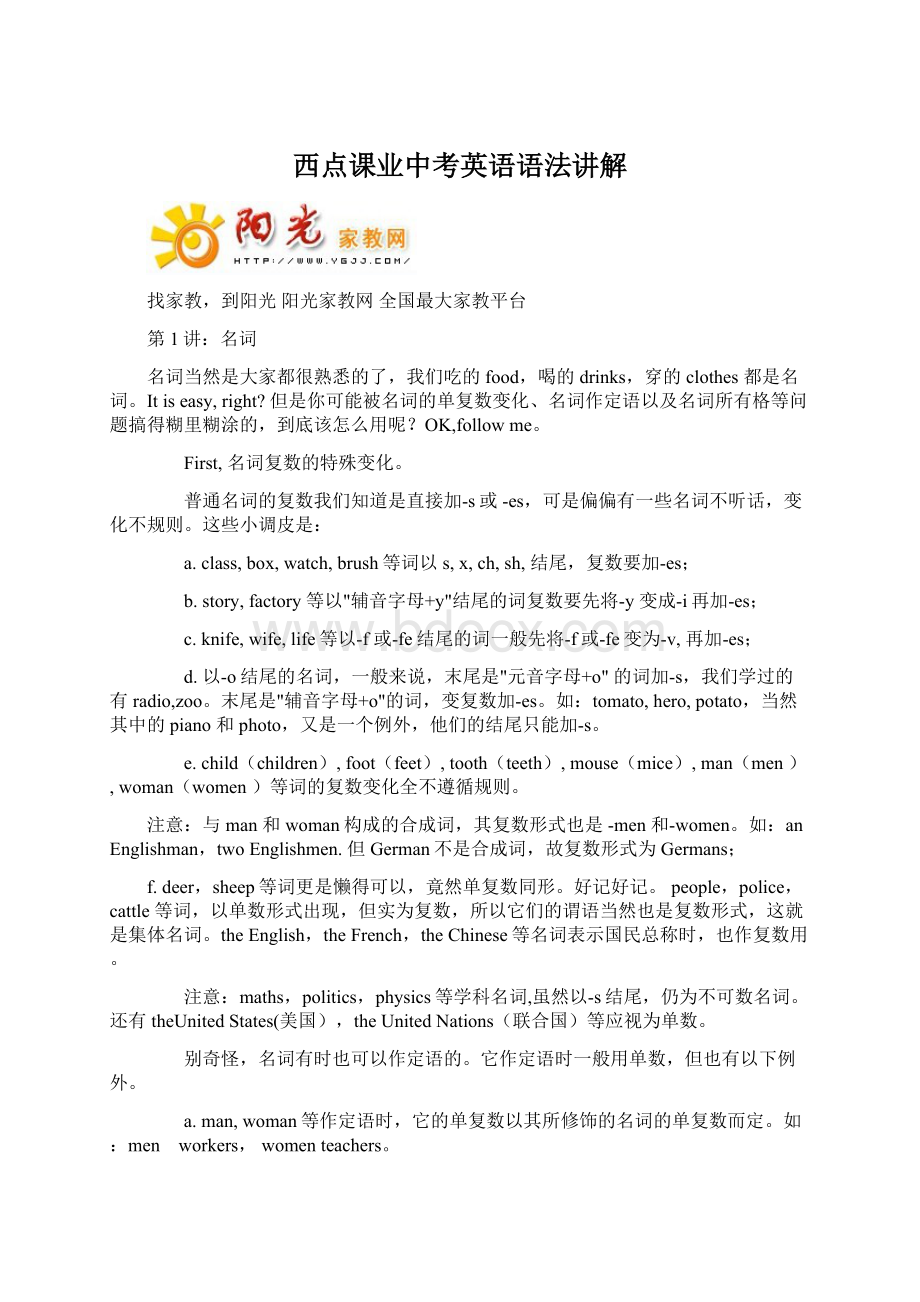西点课业中考英语语法讲解.docx
《西点课业中考英语语法讲解.docx》由会员分享,可在线阅读,更多相关《西点课业中考英语语法讲解.docx(96页珍藏版)》请在冰豆网上搜索。

西点课业中考英语语法讲解
找家教,到阳光阳光家教网全国最大家教平台
第1讲:
名词
名词当然是大家都很熟悉的了,我们吃的food,喝的drinks,穿的clothes都是名词。
Itiseasy,right?
但是你可能被名词的单复数变化、名词作定语以及名词所有格等问题搞得糊里糊涂的,到底该怎么用呢?
OK,followme。
First,名词复数的特殊变化。
普通名词的复数我们知道是直接加-s或-es,可是偏偏有一些名词不听话,变化不规则。
这些小调皮是:
a.class,box,watch,brush等词以s,x,ch,sh,结尾,复数要加-es;
b.story,factory等以"辅音字母+y"结尾的词复数要先将-y变成-i再加-es;
c.knife,wife,life等以-f或-fe结尾的词一般先将-f或-fe变为-v,再加-es;
d.以-o结尾的名词,一般来说,末尾是"元音字母+o"的词加-s,我们学过的有radio,zoo。
末尾是"辅音字母+o"的词,变复数加-es。
如:
tomato,hero,potato,当然其中的piano和photo,又是一个例外,他们的结尾只能加-s。
e.child(children),foot(feet),tooth(teeth),mouse(mice),man(men),woman(women)等词的复数变化全不遵循规则。
注意:
与man和woman构成的合成词,其复数形式也是-men和-women。
如:
anEnglishman,twoEnglishmen.但German不是合成词,故复数形式为Germans;
f.deer,sheep等词更是懒得可以,竟然单复数同形。
好记好记。
people,police,cattle等词,以单数形式出现,但实为复数,所以它们的谓语当然也是复数形式,这就是集体名词。
theEnglish,theFrench,theChinese等名词表示国民总称时,也作复数用。
注意:
maths,politics,physics等学科名词,虽然以-s结尾,仍为不可数名词。
还有theUnitedStates(美国),theUnitedNations(联合国)等应视为单数。
别奇怪,名词有时也可以作定语的。
它作定语时一般用单数,但也有以下例外。
a.man,woman等作定语时,它的单复数以其所修饰的名词的单复数而定。
如:
men workers,womenteachers。
b.数词+名词作定语时,这个名词一般保留单数形式,中间加连字符。
如:
aten-milewalk十里路,two-hundredtrees两百棵树。
哇!
这些问题好复杂,我好想轻松一下。
那我们就轻轻松松地面对名词所有格问题。
这里面内容可谓少之又少,可也不能小视呦。
名词所有格:
表示“……的”通常是在名词的后面加-s,如:
Children'sday,father'sshoes。
但以-s结尾的名词因为已经有s了,只需加'就OK了。
如果两个名词并列,并且分别有's,.则表示“分别有”。
.如:
John'sandMary'sroom(约翰和玛丽各有一间,共两间);两个名词并列,只有一个's,则表示"共有"。
如:
JohnandMary'sroom(约翰和玛丽共有一间)。
还有些无生命名词的所属要用介词of来帮助一下,如:
amapofChina,theendofthisterm。
好,名词部分我们已经学完,It'sapieceofcake?
接下来到了我们趁热打铁的时间了,
Areyouready?
练习:
1.Allthe_____teachersand______studentsarehavingameetingthere.
A.women…girls
B.women…girl
C.woman…girls
D.woman…girl
2.MrBlackisafriendof_________.
A.Jack'saunt's
B.Jack'saunt
C.Jackaunt's
D.aunt'sofJack
3.Thistoywasmadebya____boy.
A.ten-year-old
B.ten-years-old
C.ten-year-older
D.ten-years-older
4.Thefarmerraisedten_________.
A.sheeps
B.deers
C.horse
D.cows
5.Shelookedatussadlywithhereyesaslargeas_________.
A.hergrandmother
B.hergrandmother's
C.hergrandmothers'
D.thatofhergrandmother
6.Wehavemovedintoa________.
A.two-storeyhouse
B.houseoftwostorey
C.two-storeyshouse
D.twostoreyshouse
7.The______wastoomuchforthechildtocarry.
A.box'ssteel
B.boxofasteel
C.steelbox
D.boxofthesteel
8.We'llgiveourEnglishteacheracardfor_________.
A.theTeacher'sDay
B.Teacher'sDay
C.aTeacher'sDay
D.Teachers'Day
9.LiPingmetanoldfriendof_______onatrainyesterday.
A.he
B.him
C.his
D.her
10._________arebigandbright.
A.Theclassroomwindow
B.Thewindowoftheclassroom
C.Thewindowsoftheclassroom
D.Theclassroom'swindows
实战:
1.Don'tworry.Yoursonwillcomebackin______hour.
A.a
B.an
C.the
D./
2.Thisniceblouseisn'tmine.It's______.
A.you
B.your
C.Lucy
D.yours
3.What's"potato"inChinese?
-It's_____.
A.香蕉
B.大白菜
C.西红柿
D.土豆
4.Theninthmonthofayearis_______.
A.December
B.November
C.September
D.October
5.A:
MustIleavenow?
B:
No,you_______.
A.needn't
B.mustnt
C.don't
D.won't
6.Wehaveahistorylesson______Wednesdayafternoon.
A.on
B.of
C.at
D.to
7.Suanhasmadequite______friendssinceshecametoChina.
A.few
B.afew
C.little
D.alittle
8.A:
Haveyouever______totheWestLake?
B:
Yes,I______therelastwinter.
A.gone,went
B.been,went
C.gone,havebeen
D.been,have
9.Doyou________English?
A.tell
B.say
C.talk
D.speak
10.A:
MayI_______yourruler?
B:
OK,I'mgladto_______ittoyou.
A.lend,borrow
B.lend,lend
C.borrow,lend
D.borrow,borrow
11.We'llgotothemuseumifit_______tomorrow.
A.can'train
B.won'train
C.don'train
D.doesn'trian
12.Doyouknow________?
A.wheredoeshestudy
B.hestudieswhere
C.wherehestudies
D.hewherestudies
13.A:
_______doyougotoseeyourgrandparents?
B:
Onceamonth
A.Howoften
B.Howlong
C.howmuch
D.howmany
14.A:
Wouldyoulikeanothercupoforange?
B:
______I'mfull.
A.No,thanks
B.Yes,please.
C.Hereitis.
D.Idon'tlike.
15.Youmustbetired.Whynot________arest?
A.tostoptohave
B.stophaving
C.stoptohave
D.tostophaving
第2讲:
代词
我们刚刚讲完了名词,现在再来看看名词的brother—代词。
它与名词的作用其实很相似,所担当的句中成分也相差不多。
但也别小看代词呀!
它还有很多的“小个性”呢!
只要抓住它的几个“小脾气”,那么你就可以牢牢地掌握它了。
代词中第一个“小个性”就是物主代词。
像my和mine这两个小冤家总是让人分不清谁是谁。
但你只要记住它们最重要的区别—my的后面一定要接名词,不可以单独出现,只能做定语,如:
myfather;而mine则是名词性,只能单独出现,在句中做主语和表语。
如:
Mineisgreen.It'smine.记住这两个句子,凡是名词性物主代词(yours,hers,his,its,ours,theirs)就都可以放在mine的位置上了。
这样,通过它们出现的位置不同,我们就可以把它们区别开了。
代词的第二个“罗嗦”就是它有一个小跟班-self(selves)—反身代词,也就是表示“自己、亲自”的意思。
关于反身代词,需要注意的是她不能单独做主语,但可以放在人称代词后面,做同位语。
如:
Marryherselfsaidso.玛丽她自己这么说的。
(不能说Herselfsaidso.)下面我给你开点小灶,单独讲一讲须“特特”注意的地方。
Of+名词性物主代词:
of+物主代词构成双重所有格。
公式为:
a(an,this,that)+名词+of+名词性物主代词。
牢记公式,举一反三。
因为物主代词不可与a,an,this,that,these,those,some,any,no,each,every,such,another等词一起前置,修饰一个名词,而必须用双重所有格。
如:
afriendofmine(我的一个朋友),eachbrotherofhis(他的每一个兄弟).
some,any的用法:
我们都知道some用于肯定句中,而any则用于否定句和疑问句中。
所以somebody,someone也用于肯定句中,而anybody、anyone则用于否定和疑问句中。
注意:
在Wouldyoulikesomecoffee?
(要来点咖啡吗?
)这样的肯定疑问句中,说话人认为对方的答案会是肯定的,或期望得到肯定回答时,用some而不用any。
every和each的用法:
every强调全体的概念,指三个以上的人或物(含三个),不可单独使用;each强调个体概念。
指两个以上的人或物(含两个),可单独使用.。
Everystudentinourschoolworkshard.(我们学校的学生都很用功。
)Eachstudentmayhaveonebook..(每个学生都可有一本书。
)
both,either,neither的用法:
both意为“两者全都”,与复数连用。
either意为“两者中间的任何一个”,neither表示“两者之间一个也不是”,与单数连用。
如:
BothofthethemcomefromLondon。
他们两人都是伦敦人。
Youmaytakeeitherwithyou。
两个中间你随便带哪个都行。
Neitheriscorrect。
两个都不对。
Few,afew和little,alittle的用法:
Few,afew用来代替和修饰可数名词,little,alittle用来代替和修饰不可数名词;afew和alittle着重肯定意思,相当于汉语“有几个”,“有一点儿”;few和little着重否定意思,相当于汉语“没有几个”,“没有多少”
OK,代词部分我们已经学完,It'sapieceofcake?
接下来到了我们趁热打铁的时间了,
Areyouready?
练习:
1.Wehadplentyofpaperbut______ink.
A.afew
B.few
C.notmany
D.notmuch
2.Learningaforeignlanguageisespeciallydifficultforthosewhohavehaveneverlearned______before.
A.one
B.it
C.them
D.that
3.We'reverybusybecausewe'veso______bookstoreadandso_______homeworktodoeveryday.
A.much...many
B.many...much
C.many...alot
D.alot...much
4.Ithought______ofthematterbutstillcouldn'tfindoutthereason.
A.every
B.both
C.nothing
D.everything
5.Mycarisnotsoexpensiveas________.
A.him
B.he's
C.he
D.his
6.LilyandLucyhavearrived,but_______studentsaren'thereyet.
A.other
B.others
C.theother
D.theothers
7.Therearehighbuildingson______sideofthestreet.
A.both
B.every
C.any
D.either
8.-Whatdoyouusuallyhaveforbreakfast?
-______eggsand______milk.
ALittle...afew
B.Alittle...alittle
C.Afew...alittle
D.Afew...afew
9.______isdifficultintheworldifyouputyourheartintoit.
A.Something
B.Anything
C.Nothing
D.Everything
10.Isthisstorythesameas______inthatbook?
A.theone
B.what
C.that
D.it
实战:
1.Thereis_________oldwomaninthecar.
A.不填
B.the
C.a
D.an
2.Weoftengotothepark_______Sundays.
A.on
B.in
C.at
D.from
3.Mybook________onthedesk.
A.is
B.am
C.are
D.be
4.Whichlanguageis________,English,FrenchorChinese?
A.difficult
B.thedifficult
C.moredifficult
D.themostdifficult
5.-________bookisthis?
-It'sKate's.
A.when
B.Why
C.Where
D.whose
6.-CanyouwritealetterinEnglish?
-No,I_____.
A.maynot
B.mustn't
C.can't
D.needn't
7.I________myhomeworkwhenMikecamelastnight.
A.do
B.wasdoing
C.amdoing
D.havedone
8.Hebeganto________Englishthreeyearsago.
A.learn
B.learns
C.learned
D.learning
9.Jimisadriver,_______he?
A.does
B.doesn't
C.is
D.isn't
10."What'swrong_________you?
"thedoctorasked.
A.from
B.with
C.for
D.at
11.Heisrich,________heisn'thappy.
A.or
B.so
C.and
D.but
12.-WhereisAlice?
-She__________tothelibrary.
A.goes
B.willgo
C.hasgone
D.hadgone
13."Help_________tosomefish,Mary."Myauntsaidtome.
A.themselves
B.ourselves
C.yourself
D.himself
14.We'llstayathomeifit________tomorrow.
A.rain
B.rains
C.israining
D.willrain
15.Thestudents_________onafarmfortendays.Thenthey_________toafactory.
Thoughthey_______backschool,theystillrememberthosefarmersandworkers.
A.havestayed,went,was
B.hadstayed,go,are
C.havestayed,go,havebeen
D.havestayed,went,were
第3讲:
形容词
Springiscoming.Thetreesaregreen,andtheflowersare beautiful.
多么美的季节啊!
我们要去郊游,去感受、去描绘我们周围美好的事物。
形容词会帮你忙。
可是形容词怎么使用起来老出错呀?
不是放错了位置,搞错了级别,就是在使用多个形容词作定语时排错了顺序。
当然了,形容词使用时需要遵循一些规则的。
想知道吗?
接着往下看。
abeautifullittlenewwhitewoodenhouse从这个长长的词中可以看出多个形容词作
定语时排列有一定的先后顺序。
它们往往遵循以下规律:
冠词或人称代词所有格+数词+性质+大小+形状+表示老少、新旧+颜色+事物质地、人的国籍、用途。
其实,你大可不必这样费神记,只要记住我给你的句子就可以了。
Thereissomethingwrongwithmybike。
这句话可